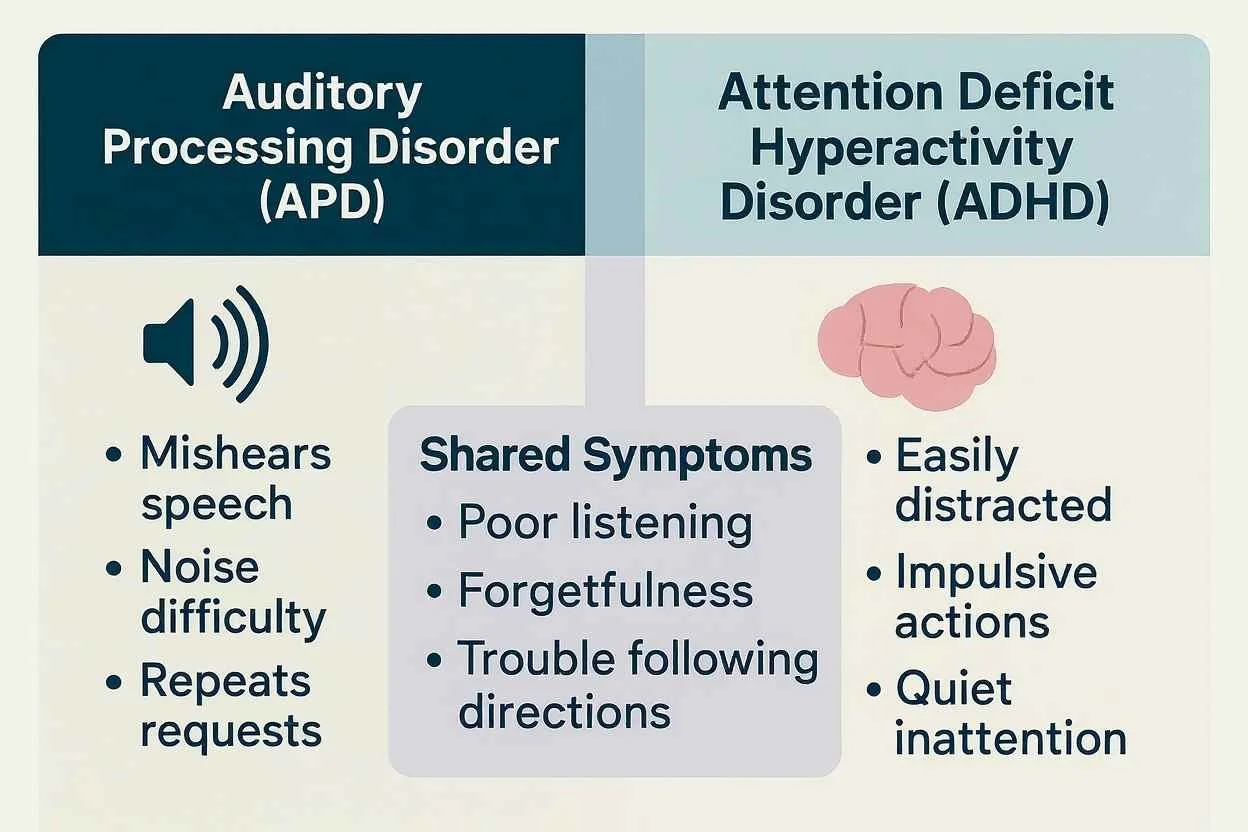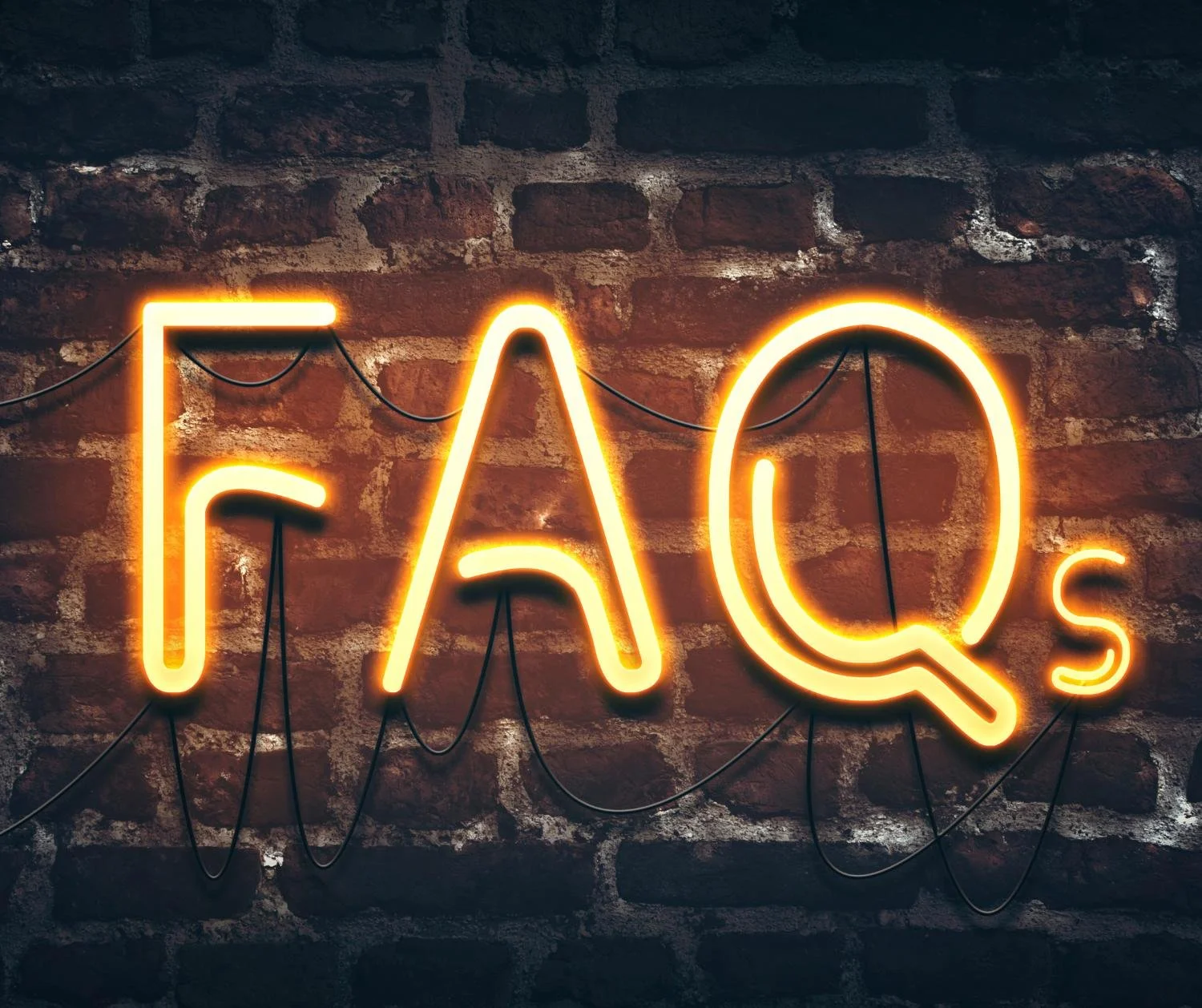Auditory Processing Disorder and ADHD: How to Tell the Difference
Children and adults who experience challenges in focusing or following directions might be dealing with more than just a short attention span. Auditory processing disorder (APD) and ADHD often look alike but come from different causes.
Both can lead to poor listening skills, especially in noisy environments. Telling them apart matters because the right support depends on an accurate diagnosis.
In this article, we’ll break down the key differences and how a speech-language pathologist can help.
Key Takeaways:
Similarities of the Two Conditions: Auditory processing disorder (APD) and ADHD share many symptoms, including poor listening skills, trouble following directions, and distractibility.
What is APD vs ADHD: APD affects how the brain processes sounds, even with normal hearing, while ADHD affects focus, self-regulation, and behavior across all settings.
APD and ADHD Symptoms: APD symptoms tend to improve in quiet spaces; ADHD symptoms usually remain, regardless of the environment.
Can Someone Have Both?: Many people have both conditions, making a full evaluation essential for accurate diagnosis and appropriate support.
What Can Help?: Speech language pathologists provide remote assessments and therapy tailored to each person’s needs, with strong results over years of experience.
What Makes These Two Conditions Seem So Similar?
What Is Auditory Processing Disorder (APD)?
What Is Attention Deficit Hyperactivity Disorder (ADHD)?
Overlapping Symptoms That Can Confuse People
Key Differences Between APD and ADHD
What Makes These Two Conditions Seem So Similar?
Auditory processing disorder (APD) and Attention Deficit Hyperactivity Disorder (ADHD) often show up with the same day-to-day challenges. Both can affect how someone listens, pays attention, and follows directions, especially in busy or loud settings.
A child might seem distracted in class, miss steps in multi-part instructions, or have trouble understanding spoken language. Adults may zone out during conversations or feel overwhelmed in loud environments.
To parents, teachers, friends, and colleagues, these behaviors can look the same. Both groups may notice poor attention span, forgetfulness, and difficulty keeping up, making it easy to mistake one for the other.
What Is Auditory Processing Disorder (APD)?
Auditory processing disorder (APD), also known as central auditory processing disorder, affects the brain’s ability to make sense of sounds. Hearing is usually normal, but the brain has trouble processing auditory information in a clear, consistent way.
People with APD often hear the sounds just fine, but they may mix up similar sounds, miss words, or lose track when someone speaks quickly or in background noise. This happens because the central auditory nervous system isn’t interpreting the sounds correctly.
Common Signs of APD
Frequently saying “what?” or asking people to repeat
Difficulty following spoken language, especially multi-step directions
Getting overwhelmed or confused in noisy environments like classrooms or restaurants
These issues are sometimes mistaken for poor attention or learning difficulties, but they stem from a processing disorder within the brain.
What Is Attention Deficit Hyperactivity Disorder (ADHD)?
Attention deficit hyperactivity disorder (ADHD) can impact focus, impulse control, and activity level. It affects how a person manages attention and behavior across different settings.
Children and adults with ADHD often struggle with executive functions, such as staying organized, planning, and completing tasks. These challenges can happen even in calm, quiet places, not just in busy environments.
Common Signs of ADHD
Difficulty sitting still or staying focused during tasks
Interrupting, blurting out answers, or talking over others
Being easily distracted, even without background noise or outside stimulation
Overcoming ADHD and Communication Difficulties
Check out this blog to learn how to overcome ADHD and communication difficulties!
Overlapping Symptoms That Can Confuse People
Auditory processing disorder and ADHD often exhibit symptoms that look the same on the surface. This overlap can make it hard for families, teachers, and even doctors to tell them apart.
Both conditions can show up as:
Trouble listening or staying engaged during lessons or conversations
Difficulty understanding spoken language or complex instructions with more than one step
Seeming distracted, forgetful, or off-task
Giving unrelated or incomplete responses in conversation
These signs could be related to auditory processing difficulties, attention deficits, or both. Without a comprehensive evaluation, it’s easy to mistake one for the other, especially in school settings.
Key Differences Between APD and ADHD
One way to tell the difference between APD and ADHD is by looking at when and where the symptoms happen.
Timing
ADHD symptoms show up across all settings, even when things are quiet or one-on-one. APD symptoms are more noticeable in noisy environments, where the brain struggles to sort out auditory stimuli.
Response to quiet
People with APD usually do better in calm, quiet spaces with fewer distractions. They may still show signs of poor attention span or impulsive behaviors, even in ideal settings.
Type of mistake
APD often causes people to mishear words or confuse similar sounds, especially with rapid speech. ADHD usually leads to skipped steps, rushed work, or answers that don’t match the question.
These patterns can help speech language pathologists and other professionals decide which diagnostic tool or auditory processing tests might help clarify what’s going on.
Can Someone Have Both?
Many people are diagnosed with both APD and ADHD. The conditions can occur together, which makes symptoms more noticeable and sometimes harder to separate.
Because they share so many signs, like difficulty paying attention, listening difficulties, and academic difficulties, it’s easy to mislabel one or miss the other. This can delay the right kind of help.
A comprehensive evaluation by a psychologist in partnership with a speech-language pathologist can sort out the differences. Using a multidisciplinary team approach and tools like an auditory processing assessment and ADHD rating scales gives a clearer picture of what each person needs.
What Can Help?
Support depends on whether a person has an auditory processing disorder, ADHD, or both. Each condition benefits from different strategies that focus on specific challenges.
For APD
Speech therapy can teach compensatory strategies, such as using context clues, visual supports, and active listening techniques, along with self-advocacy skills to improve communication in daily life. It focuses on working around processing challenges rather than directly fixing them.
Teachers can use visual cues, give directions slowly, and reduce background noise when possible.
Seating a child near their teacher or using environmental modifications can make it easier to hear and focus.
For ADHD
For adults and children, executive function coaching builds routines and improves executive functions like task management and self-control.
Medications can help with attention deficits and impulsive behaviors.
Working with mental health professionals offers support when needed.
Some people need support in both areas, so a clear diagnosis and an appropriate intervention plan matter.
Frequently Asked Questions About APD and ADHD
1. Do people with ADHD struggle with auditory processing?
People with ADHD can show signs that look like auditory processing difficulties. They might miss spoken directions or appear not to be listening.
This can be due to poor attention span, but it can also overlap with true auditory processing disorders. A speech language pathologist can help figure out the difference through auditory processing tests and a detailed case history.
2. Do people with ADHD have more sensitive hearing?
People with Attention Deficit Hyperactivity Disorder don’t usually have more sensitive hearing in a medical sense. They often experience difficulty filtering out background noise, which makes them feel overwhelmed or distracted.
This isn’t caused by hearing loss; instead, it's caused by the brain’s trouble with focus and processing auditory information.
3. Is auditory processing disorder a form of autism?
APD is not a form of autism. APD is a separate processing disorder that affects how the brain interprets sounds.
While some children with autism may also have auditory processing problems, APD has its own set of diagnostic criteria and occurs in people without autism, too.
How Connected Speech Pathology Can Support You
Connected Speech Pathology offers expert support for children and adults with auditory processing disorder and ADHD-related communication challenges. Our licensed speech language pathologists use comprehensive evaluations and systematic review to identify specific needs, looking closely at auditory processing abilities, attention deficits, and related language skills.
Speech therapy or communication and executive function coaching focuses on improving listening skills, auditory memory, and strategies for managing background noise and distraction. We tailor each session to match real-life needs at home, school, or work.
All services are provided remotely. We’ve delivered teletherapy for years with strong results. Our sessions are engaging, focused, and accessible from anywhere.
Summary
Auditory processing disorder and ADHD can look alike, but they affect the brain in different ways. Getting the proper diagnosis matters because it shapes the support each person needs.
If you or your child shows signs of an auditory processing problem, attention deficits, or trouble understanding speech, you don’t have to figure it out alone. Connected Speech Pathology is here to help with clear answers and proven support right from home.
About the Author
Allison Geller is a communication coach, speech-language pathologist, and founder of Connected Speech Pathology, an international online practice providing professional communication coaching and speech therapy for children, teens, and adults. With more than two decades of experience, she has worked in medical and educational settings, published research on aphasia, and leads a team of specialists helping clients improve skills in public speaking, vocal presence, accent clarity, articulation, language, fluency, and interpersonal communication.












